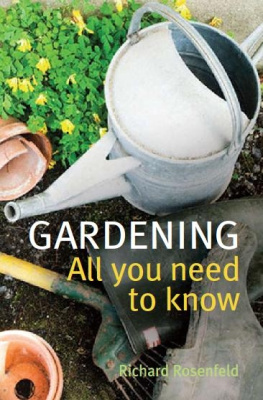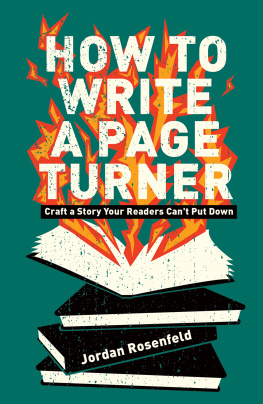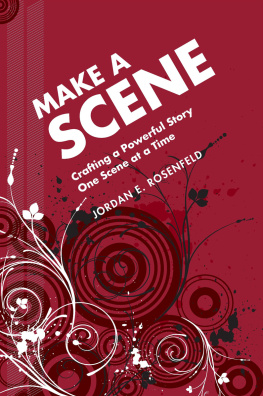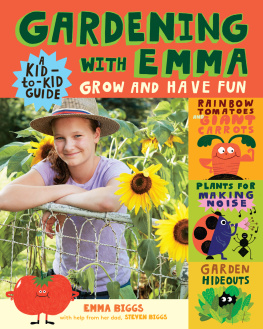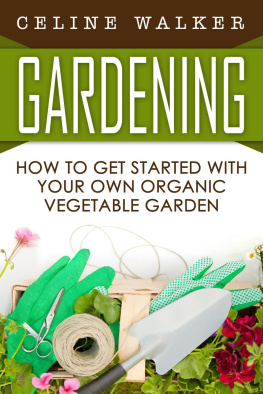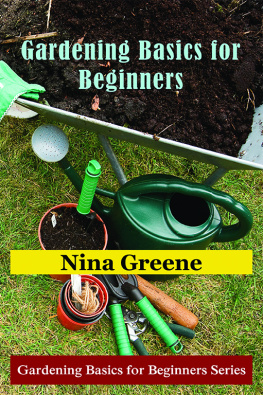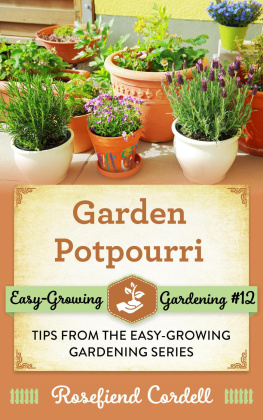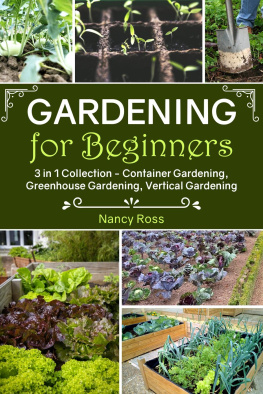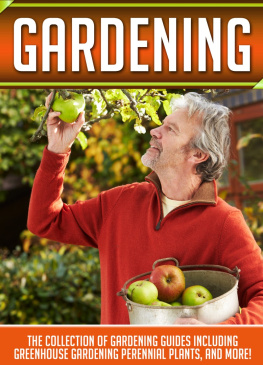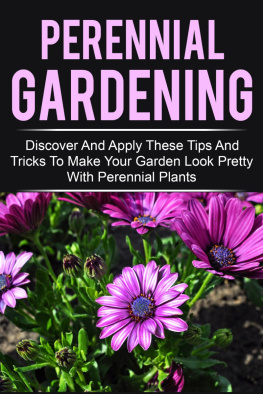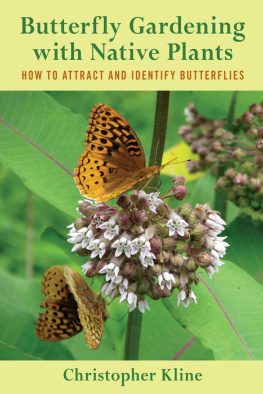GARDENING
ALL YOU NEED TO KNOW
ACKNOWLEDGEMENTS
To Alex and Alex,
Liz and Anne,
Sara, Julia and John
Also in the Right Way series
Vegetable Growing Month by Month
Vegetable, Fruit and Herb Growing in Small Spaces
The Essential Allotment Guide
Uniform with this book
GARDENING
ALL YOU NEED
TO KNOW

Richard Rosenfeld


Constable & Robinson Ltd
3 The Lanchesters
162 Fulham Palace Road
London W6 9ER
www.constablerobinson.com
First published by Right Way, an imprint of
Constable & Robinson, 2010
Copyright Richard Rosenfeld 2010
The right of Richard Rosenfeld to be identified as the author of this work has been asserted by him in accordance with the Copyright, Designs & Patents Act 1988.
All rights reserved. This book is sold subject to the condition that it shall not, by way of trade or otherwise, be lent, re-sold, hired out or otherwise circulated in any form of binding or cover other than that in which it is published and without a similar condition including this condition being imposed on the subsequent purchaser.
A copy of the British Library Cataloguing in Publication Data is available from the British Library
ISBN: 978-0-7160-2236-7
Printed and bound in the EU
1 3 5 7 9 10 8 6 4 2
CONTENTS
1
THE GARDENS ENGINE THE SOIL
Flannery OConnor said that to write fiction you need a dash of calculated stupidity. Spot on. And the same with gardening. Except, and this is where everything starts, the goal is fizzing, nutritious soil. Oxygenated, fertile, crumbly.
Soil isnt inert, fixed and preserved. Millions of years ago it was mainly rock; now its alive, creating new plant food. A potent mix of minerals and organic matter. Living organisms in the soil react with the dead, generating a multitude of chemicals. And the soil is a biological powerhouse, booming with millions of single-celled bacteria in every single spoonful. Think of it as a great quivering foetus needing to be fed and pampered on an Olympic scale; the more organic material you fork in, the better. Put your ear to the ground and you can virtually hear it belch.
Good soil does three things. It feeds plants with ever-changing levels of oxygen, nutrients and water, it protects the roots from the fiercest summer heat and winter cold, and it provides the anchorage, locking plants in the ground. And what no one seems to realize is that most roots are right beneath your feet, in the top 1015cm (46in) of soil. They rarely plunge any deeper. Theyre not racing to the centre of the earth. Which begs the question, why doesnt the topsoil resemble the deep-below? Because what you can poke and finger and smell is largely foreign an import soil which has been dumped here from all over the place by ancient glaciers and the wind. Thats why you might have a mix of radically different kinds of soil in your garden, dumped in different places.
Keeping the soil in good shape
Good soil is the Holy Of Holies. Dont muck it around. Feed it. Here are the rules.
Add organic matter
Whenever you plant, add organic matter (composted bark, garden compost, leafmould, mushroom compost or well-rotted manure thats at least six months old) to the planting hole and thats like giving the soil an upgrade. If you want to use slow-release organics the choice includes (a) pelleted poultry manure, (b) bonemeal, (c) hoof and horn, (d) blood, fish and bone the top choice and (e) seaweed meal. They release nutrients which support both the plants and soil organisms, and theyre incredibly useful when youre adding the likes of leafmould because that hardly has any nutrients.
Organic matter also makes a fantastic mulch in late autumn (insulating plants roots when its viciously cold) and/or in early spring. Dollop it across every patch of soil, a rollicking 8cm (3in) thick, keeping it clear of the stems. Do this after a night of heavy rain and itll lock the moisture in the ground, stopping it from quickly evaporating, and initially cuts down on the amount of watering youve got to do. Mulching also hammers annual weeds by stopping the seeds getting any light and bursting into growth though it certainly wont kill existing ones (and thats why you should always weed before you mulch). Mulching and this is the best bit also improves the soil texture because the mulch eventually gets dragged down by worms. Theyre insatiable churners.
Make your own compost
There are two basic kinds, and the easiest is leafmould. When standing under a tree and the remorseless point of a tree is to muscle up that thumping storm of leaves weighing maybe 1 ton to the light, which is why trees in tropical jungles need tall, thin, agile, 4-minute-a-mile trunks because theyve got to leg it through the canopy to get to the sun as quickly as possible look up at all those leaves and say to yourself Compost, like Homer Simpson dribbling over a doughnut. All those flapping up-there leaves will soon be down here, under your feet, giving you a crumbly, open soil. And its not just deciduous trees which drop leaves; so do evergreens.
The quickest way to make the autumn leaves vanish is to hoover them up in the lawnmower. In fact shredding them with grass clippings is a good(ish) thing because that boosts their low nutrient levels, but that isnt the point. Using compost is like putting yeast in bread. It activates. It conditions and improves the soil. But get rid of any tough, thick leaves and chuck them in your main compost heap (see below) because they take so long to rot down. Now pack all the leaves you are keeping into black bin bags, quickly spray inside with water and then tie up the top and stab the sides to let in air. Thats it. Stack them away in a cool place for 1216 months. The longer you leave them, the crumblier the end product. Alternatively, create a permanent open container using four stout posts about waist high hammered in the ground, with nailed up chicken wire for the walls, and more chicken wire for the lid, and let the leaves rot down in there but it will take much longer. (See Fig. 1 overleaf.)
The main garden compost heap has more nutrients and is terrific at opening up the soil making it crumblier which is essential when the ground is gunky, lumpy and heavy. Use anything from grass clippings and kitchen scraps (eg vegetable peelings and tea leaves) to annual weeds, paper and cardboard. Avoid meat because youll get rats, diseased plants, the seedheads of weeds and anything that has been doused with weedkiller. The key rules are, first, buy a compost bin (OK) or make a wooden one (go for it). Stand it in the sun on well-drained soil, not tarmac. You want worms yo-yoing in and out, up-down, aerating, churning.

Fig. 1. A DIY container for leaves to make leafmould.
For the DIY kind (Fig. 2), make three walls about waist high from airy wooden slats nailed to stout posts, but the front wall isnt fixed in place because you need to remove it to get in and turn over the pile, letting in oxygen. Or make the walls from wooden pallets from a builders yard. Then youll need a lid to keep the compost dry and retain the heat. In both cases, thats the ready-made and DIY kind, the bigger the bin the better and, if youve got room, aim for three (yes,
Next page
